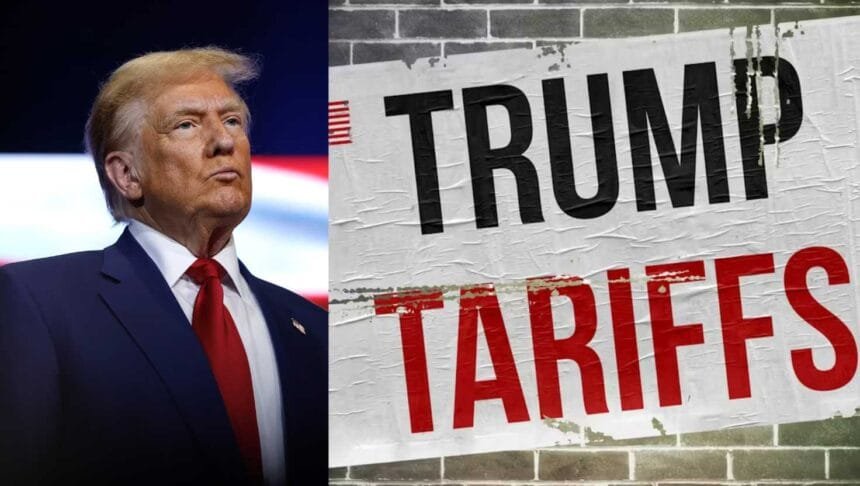President-elect Donald Trump is apparently thinking about declaring a national economic emergency so that sweeping tariffs can be put in place on both allies and enemies. This could change the way trade works around the world.
People who have been involved in the talks say that this plan would use the International Economic disaster Powers Act (IEEPA), a law that gives the president a lot of power to control imports during a national disaster.
IEEPA: A Key Tool in Trump’s Tariff Strategy
The IEEPA, often viewed as a powerful yet controversial tool, allows a president to impose trade restrictions without the need to justify them on national security grounds.
Trump’s previous use of the IEEPA in 2019 to pressure Mexico on immigration policy demonstrated the statute’s potential impact.
Although the threatened tariffs on Mexican imports were never implemented, the move underscored Trump’s willingness to use unconventional methods to achieve policy objectives.
Sources indicate that Trump has a strong affinity for the IEEPA, given its broad jurisdiction and minimal procedural hurdles.
A senior insider stated, “Nothing is off the table,” highlighting the robust internal discussions surrounding this potential declaration.
Exploring Legal Avenues for Tariff Implementation
While no final decision has been made, Trump’s advisors are reportedly exploring multiple legal pathways to support the proposed tariff program. These include:
- Section 338 of U.S. Trade Law
This provision enables the president to impose retaliatory tariffs on nations that discriminate against U.S. commerce. Though rarely used in modern trade policy, it could serve as a foundation for targeted tariffs in specific product categories. - Section 301 of U.S. Trade Law
Famously utilized during Trump’s first term to justify tariffs on Chinese goods, this law requires a formal investigation into unfair trade practices. While effective, the lengthy procedural requirements and lobbying efforts by affected companies make it less immediate than the IEEPA. - Expanding Existing Tariffs
Trump could build upon tariffs left intact by the Biden administration, particularly those targeting industries like electric vehicles. Adjusting these tariffs would require less legal maneuvering and could provide immediate leverage in trade negotiations.
Balancing Economic Strength and Policy Goals
In a recent press conference, Trump gave a positive outlook on the U.S. economy, saying it was on track for big growth over the next four years.
He acknowledged inflationary pressures but emphasized strong economic approval ratings and predicted a quick rise in the economy.
However, it is still unclear what specific evidence Trump would use to justify a national economic emergency.
Critics say that declaring such an emergency without a clear crisis could lead to legal challenges and hurt trust in U.S. trade policy.
Supporters Advocate for Pro-Tariff Policies
Proponents of the proposed tariffs argue that they are essential for revitalizing American manufacturing and securing economic independence.
Nick Iacovella, Senior Vice President of the Coalition for a Prosperous America, stated, “The Trump team understands we have to rebuild our industrial capacity for reasons of economic and national security.
A robust, pro-American trade policy that includes tariffs is critical to achieving these goals.”
This perspective aligns with Trump’s broader vision of resetting global trade dynamics to prioritize U.S. interests.
By imposing tariffs, the administration aims to protect domestic industries from foreign competition, incentivize local production, and reduce reliance on imported goods.
Potential Challenges and Opposition
The prospect of a national economic emergency declaration has sparked concern among business groups and trade experts.
During Trump’s previous tariff threats, organizations like the Chamber of Commerce and the Business Roundtable mobilized to challenge the legality of such actions.
If Trump proceeds with this approach, similar opposition is expected, particularly from industries heavily reliant on global supply chains.
Moreover, implementing universal tariffs could strain relationships with key allies, complicating diplomatic efforts on other fronts.
Critics also warn that tariffs often lead to retaliatory measures, potentially escalating trade tensions and harming American exporters.
A Strategic Gamble for Global Trade
As Trump’s team evaluates the legal and economic implications of a national economic emergency, the move represents a high-stakes gamble to reshape international trade.
If executed, the tariffs could bolster domestic manufacturing and address trade imbalances. However, they also risk triggering economic and political backlash, both at home and abroad.
The coming weeks will likely reveal more about the administration’s plans and whether Trump is willing to invoke the IEEPA to achieve his trade objectives.
For now, the idea remains a subject of intense deliberation within his team, with potential implications that could reverberate across global markets.
While supporters hail the move as a necessary step toward economic independence, critics caution against the risks of unilateral action, emphasizing the importance of a balanced and collaborative approach to trade policy.
Whether Trump’s bold vision will materialize remains to be seen, but the discussions underscore his determination to leave a lasting impact on U.S. trade policy.



